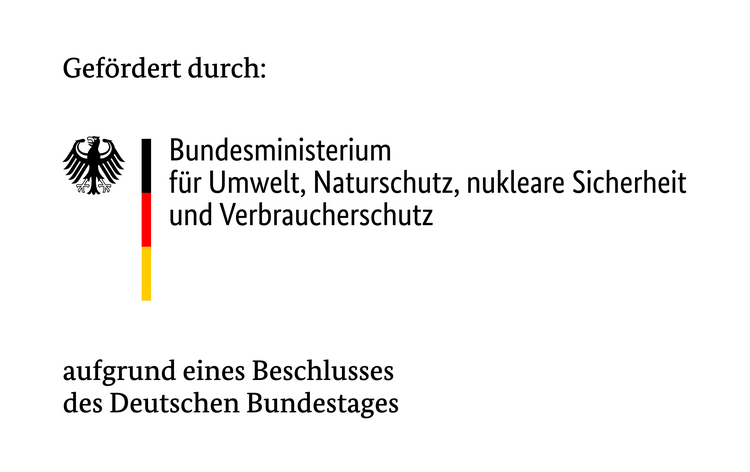Funded
The project executing organization is Zukunft-Umwelt-Gesellschaft (ZUG)
(Project duration: 1.12.2021 bis 30.11.2024)
For further information please visit the joint project website.
WindGISKI
Development of an AI-based geoinformation system for the selection of wind energy potential areas considering the conflict between the protection of species, environment and climate

Renewable energy is potentially available in unlimited quantities. However, in densely populated countries such as Germany, numerous land use conflicts arise when renewable energy technologies are rolled out, especially regarding onshore wind energy. In this area of conflict, the WindGISKI research project is developing and evaluating a geographic information system (GIS) based on artificial intelligence (AI). This is intended to systematize and automate the identification and evaluation of potential areas for wind power plants. This should improve the number and quality of future designated potential areas for wind energy use. The GIS should not only consider technical, geographical, and economic potentials of possible wind energy areas, but also include ecological and social factors.
The working group "Organization & Innovation" at the University of Oldenburg is part of the WindGISKI project network. The project is funded by the "KI-Lighthouses" program of the German Federal Ministry for the Environment, Nature Conservation, Nuclear Safety and Consumer Protection (BMUV) and will run until Nov. 30, 2024. Other partners in the project network are the Institute for Statics and Dynamics (ISD), the Institute for Information Processing (TNT) (both University of Hannover), the Institute for Integrated Production Hannover gGmbH (IPH), Nefino GmbH, the Institute for Wind Energy (fk-wind, Bremerhaven University of Applied Sciences and Arts), the Working Group for Regional Structural and Environmental Research GmbH (ARSU, Oldenburg), and the Association of Renewable Energies Lower Saxony / Bremen e.V. (LEE, Hannover).
Bringing social science perspectives into the development of an AI application
In the subproject of the University of Oldenburg, a social science investigation of at least six completed wind energy projects will be conducted. The projects studied will be selected using a previously conducted expert-based area scoring and represent "best" or "worst cases". The course of these historical wind energy projects is analyzed in terms of their social dynamics and conflict lines. This analysis extends the focus of the WindGISKI approach to the entire planning process of wind energy plants. The goal is to understand specific influencing factors, interaction dynamics, and processes that positively or negatively affect the efficient implementation of a wind energy project. These social science findings will be fed back into the development of the AI-based GIS and will be used to optimize the potential area analysis of the AI, as well as to classify the applicability of the results
Methodically and theoretically, the subproject ties in with other projects from the working group (e.g. REENEA). Semi-structured expert interviews will be conducted with different groups of actors involved in the respective project, especially project developers and operators (SMEs, utilities, citizen energy), civil society actors (citizens, landowners, nature conservation associations, citizens' initiatives), community representatives (politics / administration) and expert survey companies. The scientific approach is based on a classical comparative case study approach of qualitative social research. If necessary, this will be supplemented by QCA (Qualitative Comparative Analysis). The empirical findings contribute to social science debates in innovation, transition and acceptance research.
WindGISKI results workshop in Hanover: Together with its project partners, the OrgInn working group presents its research results
The results workshop of the three-year WindGISKI research project took place in Hanover on October 22, 2024. A total of eight project partners from science and practice were involved in this project - including the Institute of Social Sciences at the University of Oldenburg. The aim of the research project was to find out to what extent artificial intelligence (AI) can be used in the search for and designation of potential areas for wind energy. To this end, an AI-based geographical information system (GIS) was developed and presented in a demo version. For this AI tool, Germany was divided into 50x50 meter tiles and the AI was trained to evaluate the tiles according to their suitability for wind power locations. Even though this demo version already illustrates the potential of using AI in this area, further steps would be necessary to develop a market-ready product.
However, even a full version of an AI-based GIS would not guarantee the accelerated expansion of wind energy.
This is the conclusion reached by Jannika Mattes and Tamara Schnell from the OrgInn working group at UOL. As part of the project, they used six case studies from five different federal states to investigate which factors and dynamics can arise in the further course of wind power projects that go beyond the selection of sites. It became clear that although planners and project planners can better assess the potential for conflicts by selecting low-conflict areas with the help of AI, this is no guarantee that the project will proceed without conflict. To accelerate expansion, projects must therefore be examined more closely in addition to the selection of sites. The success of projects therefore depends on the specific composition of site characteristics, stakeholders involved and socio-cultural factors. The willingness and ability of all stakeholders involved, such as local politicians, authorities, planners and project developers, to resolve conflicts is key.
And what's next for WindGISKI?
Even though the main project has now been completed, some project partners are still working and trying to refine their findings. The UOL team is also continuing to work on the evaluation of the case studies until the end of June 2025, which will be made available to academics and practitioners in various formats.
To get a better insight into the project and the results workshop, please take a look at the various media reports on the project.
Article from Deutschlandfunk in “Umwelt und Verbraucher”: https://www.deutschlandfunk.de/umwelt-und-verbraucher-100.html
Further news articles:
- https://www.windkraft-journal.de/tag/windgiski?doing_wp_cron=1729778311.9489860534667968750000
- https://www.windkraft-journal.de/2024/10/23/windgiski-ein-meilenstein-fuer-die-windkraftplanung-mit-kuenstlicher-intelligenz/205493
- https://www.rundblick-niedersachsen.de/kuenstliche-intelligenz-verleiht-der-suche-nach-windkraftflaechen-neuen-schwung/
- https://www.erneuerbareenergien.de/technologie/onshore-wind/forschungsprojekt-ki-tool-hilft-bei-der-windflaechenanalyse
- https://www.nwzonline.de/niedersachsen/kuenstliche-intelligenz-in-niedersachsen-geoinformationssystem-revolutioniert-windkraftplanung_a_4,1,2879838191.html#
- https://www.noz.de/deutschland-welt/niedersachsen/artikel/niedersachsen-ki-optimiert-windkraft-flaechenauswahl-47895830
Publications:
Alsheimer, Sven; Schnell, Tamara; Chlebna, Camilla; Rohe, Sebastian (2024): Competing terms for complementary concepts? Acceptance and legitimacy. In: Renewable and Sustainable Energy Reviews 207, S. 114960. https://doi.org/10.1016/j.rser.2024.114960
Rohe, S., Chlebna, C. (2021): A spatial perspective on the legitimacy of a technological innovation system: Regional differences in onshore wind energy. In: Energy Policy, 151, 112193. doi.org/10.1016/j.enpol.2021.112193


